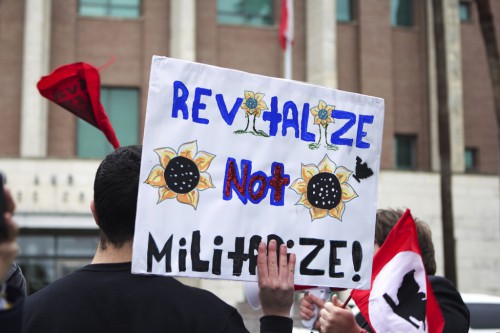The U.S.-Mexico border is a militarized zone. Millions of dollars are invested yearly to have a surveillance system that monitors activity that crosses the Rio Grande. With politicians in Washington working to pass a “comprehensive” immigration reform, securing the border has been the center of negotiations.
A recent investment to “protect” the border was made last year to Elbit Systems, an Israel-based company that provides arms to the Israeli military, as reported by multiple media outlets. The contract was for a total of $145 million, which included drones, radar, and unmanned towers, according to The Guardian.
There is no question that we should have protection along our border to monitor dangerous activities. However, the conversation on “securing” our border has focused on the high number of immigrants that migrate north from Latin America, a specific example during the summer when a wave of immigrants from Honduras, El Salvador, and Guatemala were fleeing their home countries because of the high violence rates.
During the summer, former Governor Rick Perry deployed 1,000 National Guard troops to south Texas in direct response to the thousands of immigrants, including unaccompanied minors, who were trying to cross into the U.S. by taking the perilous journey through harsh terrain along the Rio Grande. While the troops joined the border patrol agents already surveilling the area and took hundreds of immigrants to detention centers, the residents of the Rio Grande Valley drove to work seeing tanks and trucks with troops along the highways.

The RGV, a safe and quiet community, suddenly wondered if there was something to be afraid of, an unsubstantiated fear instilled by our government’s manipulative ways to treat poor immigrants as potential threats to our communities’ safety. The government did not appear to consider the conditions the immigrants were running from in Central America.
The real threat is the militarization itself. It affects communities that live along the borderlands and immigrants disproportionately by formulating the narrative that it is a dangerous place to live. It leads to police profiling, obsessive surveillance, and pouring money into technologies rather than investing on much-needed education and health care.
A company supplying these technologies is Elbit. They are described as “the backbone of Israel’s defense forces” by International Business Times because they are the largest supplier to the Israeli military.
Not only does the U.S. border militarization affect residents at home, but with the U.S. federal government completing a contract with Elbit, we are arming the Israeli military on their continuous humanitarian crimes against the Palestinians. We are funding their unwillingness to create a peaceful negotiation, and we are funding their stubbornness to recognize a group of people.
In their Code of Ethics, Elbit Systems claims to fight against discrimination, yet their multi-million dollar products perpetuate discrimination across borders around the world. Elbit claims to stand against harassment, yet their products are used by governments to harass communities daily and marginalize them. In 2014, Elbit was named the “world’s most ethical company” by The Ethisphere Institute. I wonder if being ethical means to harm, displace, discriminate, and dehumanize. If so, then Elbit’s recognition was well deserved.
The U.S. government should consider how the companies they invest in use their funds and how their products are used. In the case of Elbit, the problems the company creates are not just half a world away, they are at home too.







